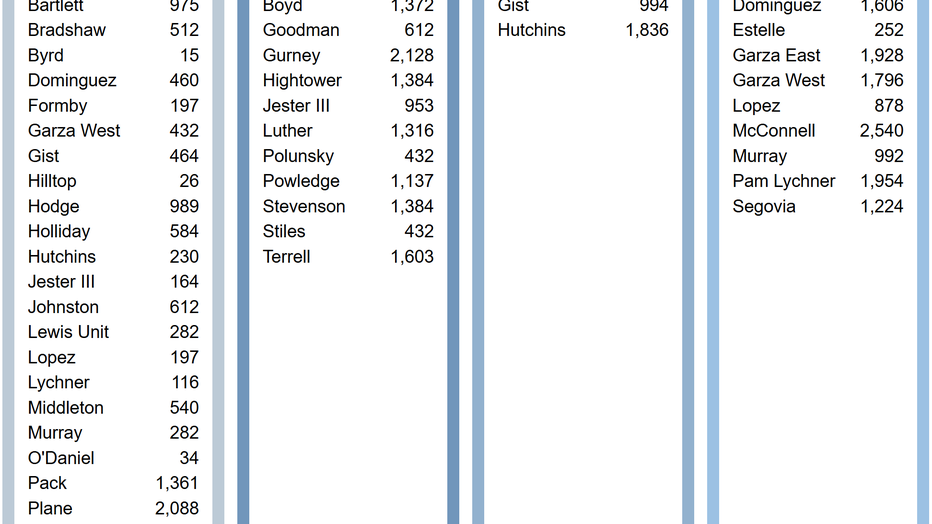The entrance to Ellis Unit in Huntsville, Texas, is marked by a double fence, a locked gate, and razor wire. Texas has the largest prison system in the nation, with the town of Huntsville being home to the system’s headquarters and nine state prisons
TEXAS – New numbers from the Texas Department of Criminal Justice project 18,000 new air-conditioned beds as a result of recent state funding in the first step towards full A/C coverage.
Here’s a look at how many prisoners will remain without A/C until the project is completed in 2032.
New TDCJ A/C update
By the numbers:
After the Texas Legislature approved a bill this session mandating A/C for all units in the system, $118 million was allocated towards the first leg of the project.
That first step, adding 18,000 beds to the A/C roster, will bring the total number of “cool beds” above 80,000, the TDCJ said in their latest update.

TDCJ Cooled Beds | Credit: TDCJ
According to the text of House Bill 3006, this phase is required to be completed by Dec. 31, 2028, with two more phases being completed in two-year increments until the end of the project on Dec. 31, 2032. Each phase is intended to cover roughly ⅓ of the uncooled beds at a cost of around $300 million all-in.
Court documents estimate 95,000 inmates are housed without air conditioning in Texas. Subtracting the 18,000 to be added in phase one of HB 3006’s funding plan, 77,000 stand to be cooled in the coming phases, and will not be addressed until after 2028 should the plan proceed as written.
Texas prisoner heat problems
Why you should care:
Advocates have raised concerns about the lack of air conditioning in TDCJ facilities for years, with experts suggesting that it poses a significant health risk for both inmates and staff.
A November 2022 study by researchers at Brown, Boston and Harvard universities found that 13%, or 271, of the deaths in Texas prisons without universal air conditioning between 2001 and 2019 may be attributed to extreme heat. Prisoner advocates say those numbers are only likely to increase as the state faces more extreme weather and heat due to climate change.
Current and former inmates have testified before judges about the “terrifying heat” in Texas prisons. One testimony in a 2024 lawsuit against the state told of eggs being cooked on concrete cell floors and thermometers obscured by tape being revealed to read 136 degrees Farenheit.
Another lawsuit filed in 2023 by Bernie Tiede, the former East Texas mortician and current convicted murderer who inspired the movie Bernie, cited severe health conditions being worsened by a stifling cell.
TDCJ enhanced heat protocols
Installing air conditioning in thousands of prison cells is no overnight job. The 2025 funding plan lays out a three-phase project to meet the goal of cooling every prisoner in the state, but the end of the road is nearly a decade away. Until then, these are the protocols in place to alleviate some of the issues caused by Texas summer heat. It’s not specified when the protocols were implemented.
- Heat-Sensitivity Score: Inmates are screened for medical conditions or medications that could make them more susceptible to heat. Those inmates with a heat-sensitivity score receive priority placement for a housing area that is air-conditioned.
- Respite Areas: Inmates are allowed access to respite areas 24 hours a day, 7 days a week, even if they are not feeling ill. They are allowed to stay in these areas as long as needed. Additionally, inmates have access to cold showers and are allowed to wear t-shirts and shorts in dayrooms and recreational areas.
- Water and Electrolytes: Water, ice, and cups are always available to inmates. Indigent inmates are provided a cup each year. Electrolyte drink mixes are available for purchase at the unit’s commissary.
- Fans and Cooling Towels: Inmates of all custody levels are allowed to purchase fans and cooling towels from commissary. Indigent inmates can request a fan on a first-come, first-served basis.
- Outside Activities: Outside activities, including work and recreation, can be restricted in accordance with agency policy. Staff and inmates participating in outside activities are provided frequent water breaks.
- Maintenance: To ensure proper functioning of equipment, staff perform preventive maintenance and prioritize repairs, as needed. This equipment includes air-conditioning units, fans, evaporative coolers, blowers, generators, vehicles, and ice machines. Diesel fuel is readily available for generators in case of power outages.
- Training and Wellness Checks: All correctional staff, volunteers, and inmates are trained on the agency’s heat procedures as well as the signs and treatment of heat-related illnesses. Additional educational materials are posted throughout the unit to provide extra resources.
- Transportation: To minimize heat-related illnesses, inmates are transported during the coolest part of the day, when possible. During transport, staff monitor inmates for heat-related illnesses. Water coolers and cups are available to inmates on the transport vehicles. Inmates are allowed to bring their fans when being transported for a medical appointment.
- Staff: Water will be provided to staff at the facilities. Staff are encouraged to increase water intake throughout the day. Additionally, staff are allowed to wear cooling towels and dri-fit compression shirts (of an appropriate color) with their uniforms.
The Source: Information in this article came from the Texas Department of Criminal Justice and previous FOX coverage.
Great Job Mack.Shaw@fox.com (Mack Shaw) & the Team @ Latest News | FOX 7 Source link for sharing this story.





